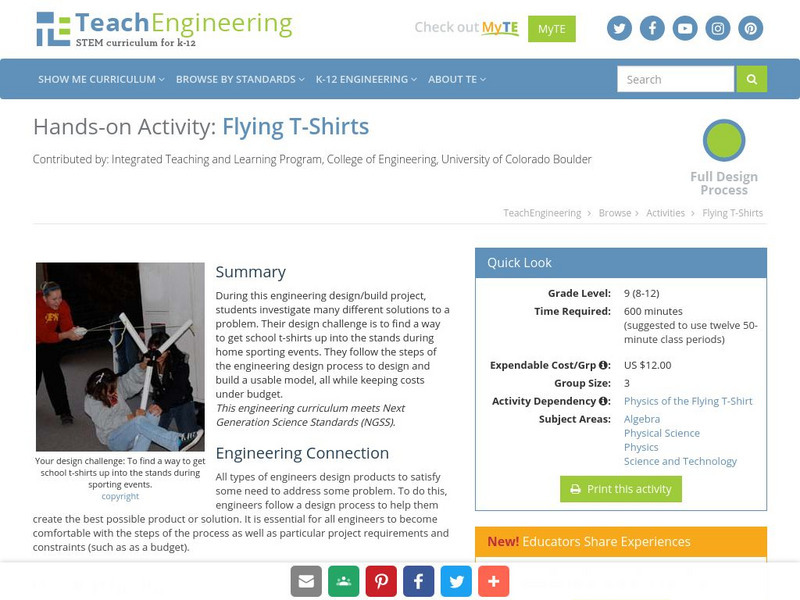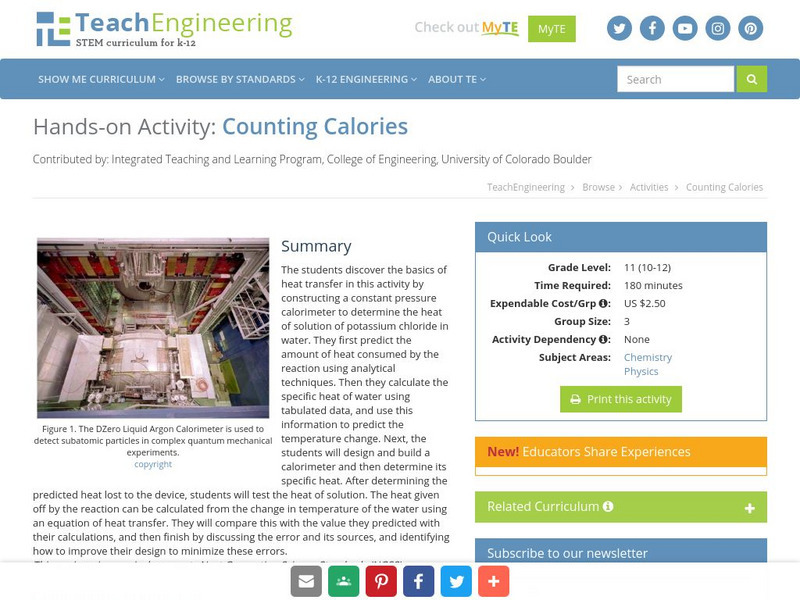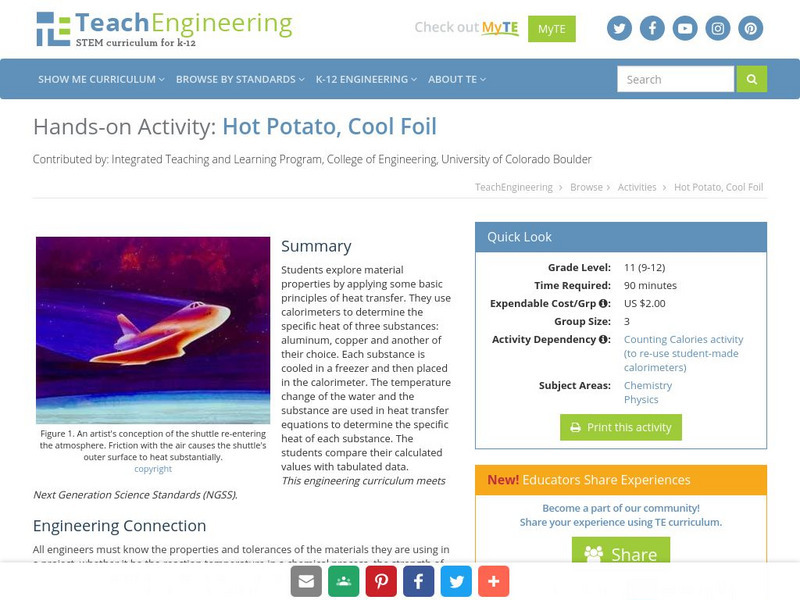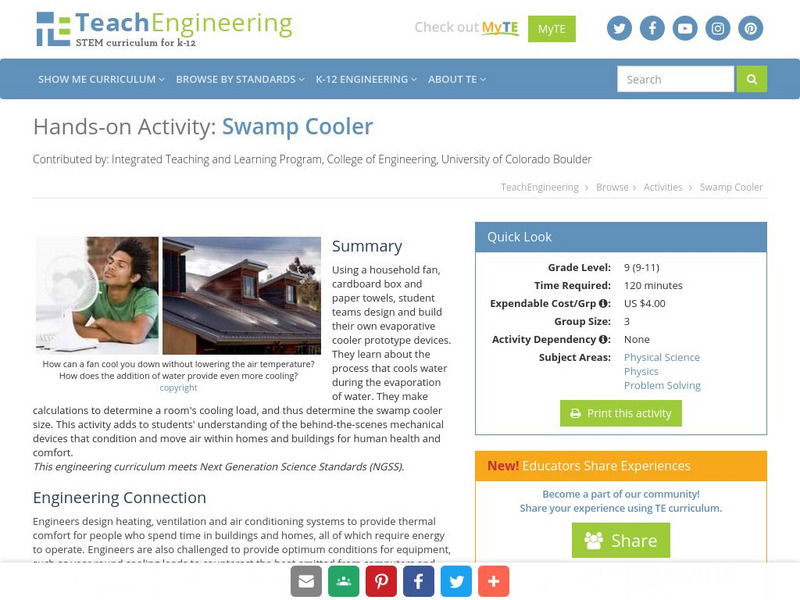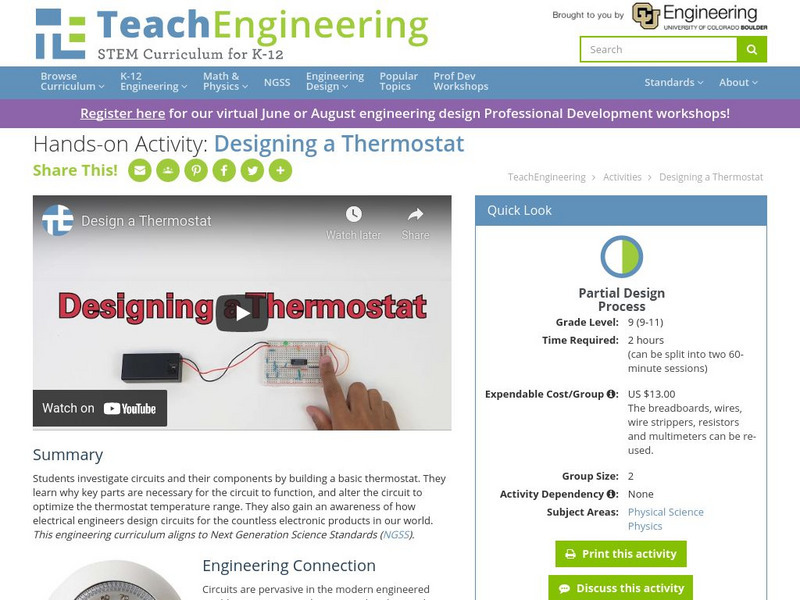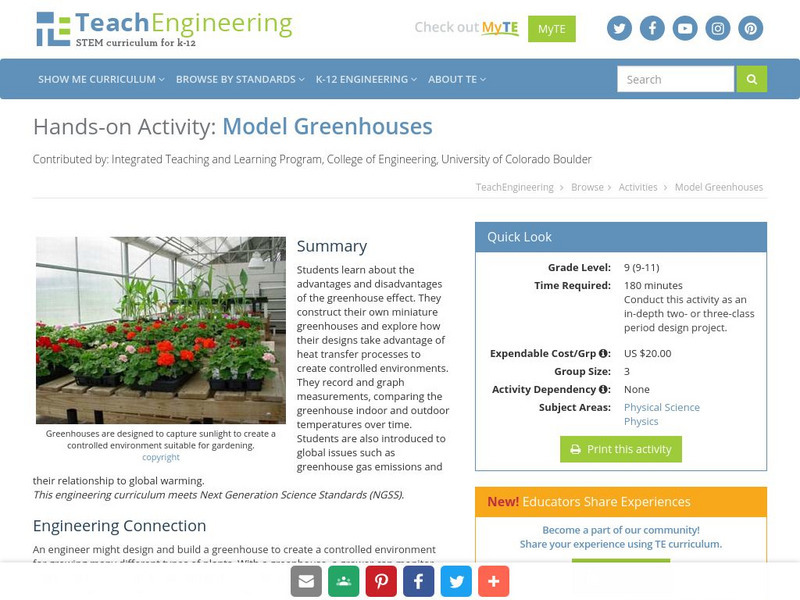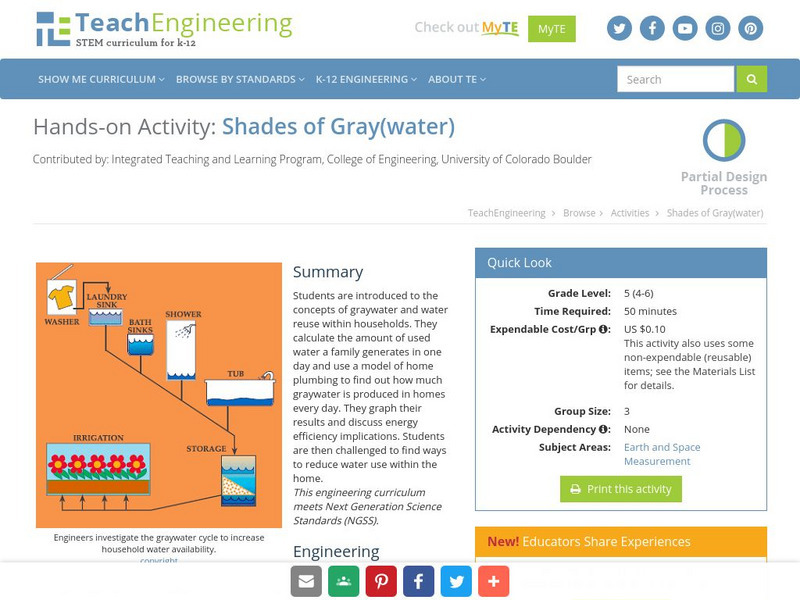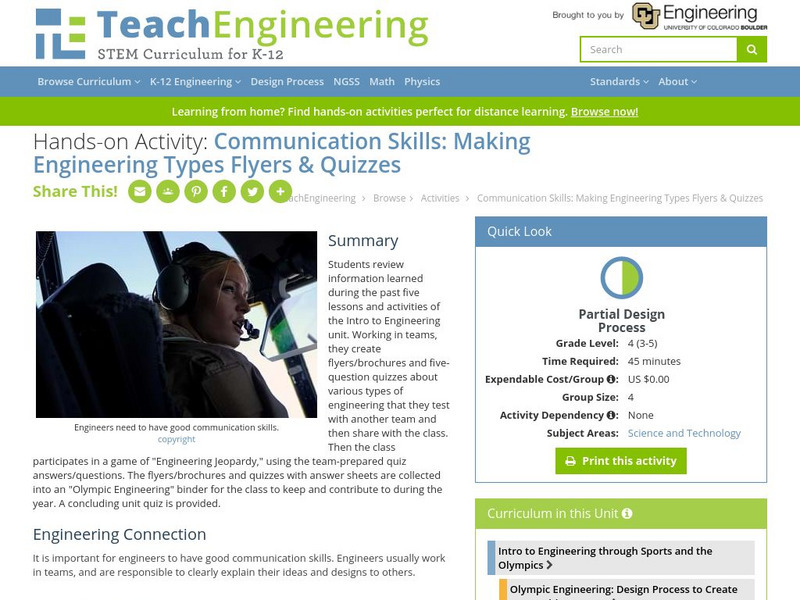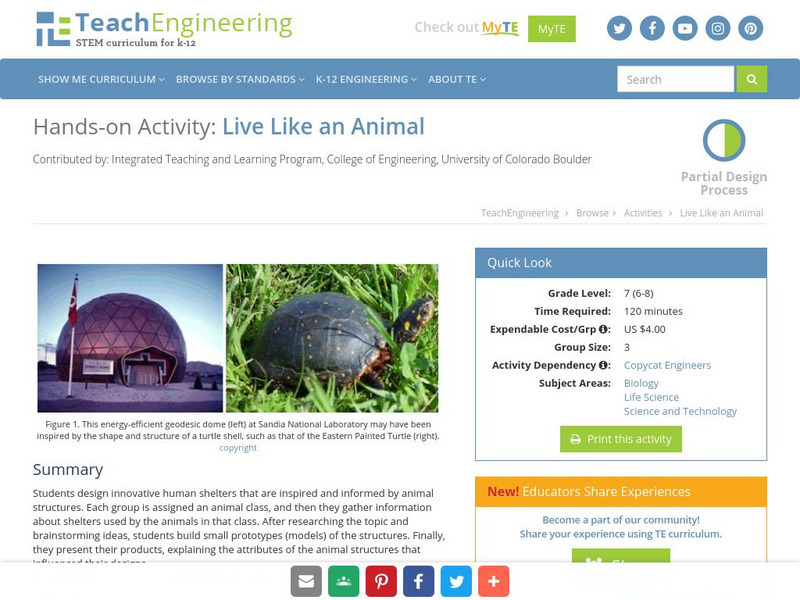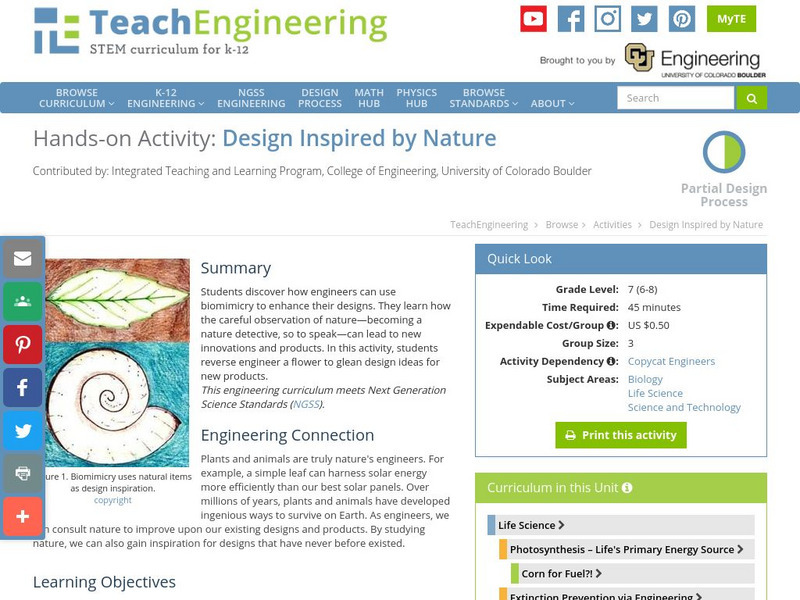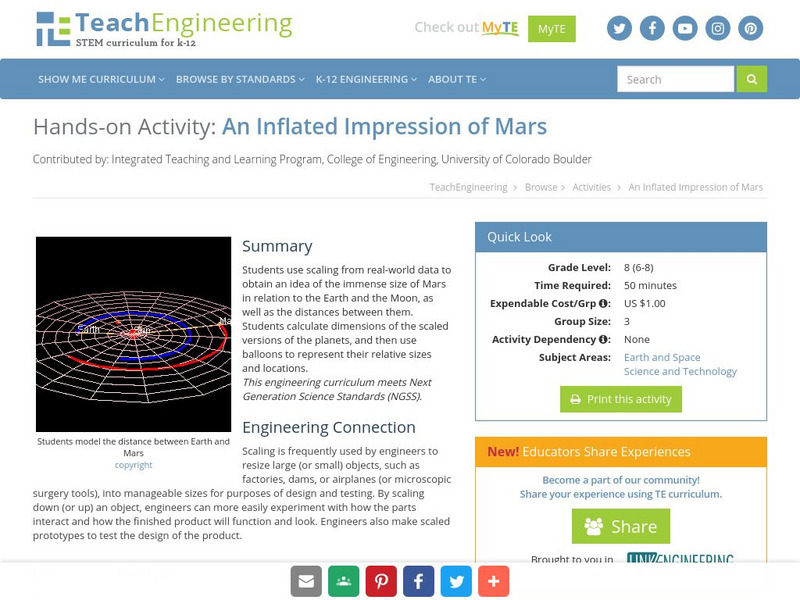TeachEngineering
Teach Engineering: Flying T Shirts
During this engineering design/build project, students investigate many different solutions to a problem. Their design challenge is to find a way to get school t-shirts up into the stands during home sporting events. They follow the...
TeachEngineering
Teach Engineering: Distorted Disturbances
Students pass around and distort messages written on index cards to learn how we use signals from GPS occultations to study the atmosphere. The cards represent information sent from GPS satellites being distorted as they pass through...
TeachEngineering
Teach Engineering: Gravity Fed Water System for Developing Communities
Students learn about water poverty and how water engineers can develop appropriate solutions to a problem that is plaguing nearly a sixth of the world's population. Students follow the engineering design process to design a gravity-fed...
TeachEngineering
Teach Engineering: Saving a Life: Heart Valve Replacement
Students use their knowledge about how healthy heart valves function to design, construct and implant prototype replacement mitral valves for hypothetical patients' hearts. Building on what they learned in the associated lesson about...
TeachEngineering
Teach Engineering: Counting Calories
The students discover the basics of heat transfer in this activity by constructing a constant pressure calorimeter to determine the heat of solution of potassium chloride in water. They first predict the amount of heat consumed by the...
TeachEngineering
Teach Engineering: Hot Potato, Cool Foil
Students explore material properties by applying some basic principles of heat transfer. They use calorimeters to determine the specific heat of three substances: aluminum, copper and another of their choice. Each substance is cooled in...
TeachEngineering
Teach Engineering: Solar Water Heater
Student teams design and build solar water heating devices that mimic those used in residences to capture energy in the form of solar radiation and convert it to thermal energy. This thermal energy is next transferred to water (to be...
TeachEngineering
Teach Engineering: Swamp Cooler
Using a household fan, cardboard box and paper towels, student teams design and build an evaporative cooler (swamp cooler). They learn about the process that cools water during the evaporation of water. They make calculations to...
TeachEngineering
Teach Engineering: Designing a Thermostat
Students investigate circuits and their components by building a basic thermostat. They learn why key parts are necessary for the circuit to function, and alter the circuit to optimize the thermostat temperature range. They also gain an...
TeachEngineering
Teach Engineering: Model Greenhouses
Students learn about the advantages and disadvantages of the greenhouse effect. They construct their own miniature greenhouses and explore how their designs take advantage of heat transfer processes to create controlled environments....
TeachEngineering
Teach Engineering: Power Your House With Water
Students learn how engineers design devices that use water to generate electricity by building model water turbines and measuring the resulting current produced in a motor. Students work through the engineering design process to build...
TeachEngineering
Teach Engineering: Zero Energy Housing
Students investigate passive solar building design with a focus solely on heating. They learn how insulation, window placement, thermal mass, surface colors, and site orientation play important roles in passive solar heating. They use...
TeachEngineering
Teach Engineering: Lunch in Outer Space!
Students learn about the unique challenges astronauts face while eating in outer space. They explore different food choices and food packaging. Students learn about the engineering design process, and then, as NASA engineering teams,...
TeachEngineering
Teach Engineering: Kidney Filtering
In this activity, students filter different substances through a plastic window screen, different sized hardware cloth and poultry netting. Their model shows how the thickness of a filter in the kidney is imperative in deciding what will...
TeachEngineering
Teach Engineering: Shades of Gray(water)
Students are introduced to the concepts of graywater and water reuse within households. They calculate the amount of used water a family generates in one day and use a model of home plumbing to find out how much graywater is produced in...
TeachEngineering
Teach Engineering: For Those Back Home
Students review information learned during the past five lessons and activities of the Introduction to Engineering unit. Working in teams, they create flyers and short quizzes about various types of engineering to share with the class...
TeachEngineering
Teach Engineering: Corn for Fuel?!
In this activity, students examine how to grow plants the most efficiently. They imagine that they are designing a biofuels production facility and need to know how to efficiently grow plants to use in this facility. As a means of...
TeachEngineering
Teach Engineering: News Flash!
This activity illustrates the interrelationship between science and engineering in the context of extinction prevention. There are two parts to the activity. The first part challenges students to think like scientists as they generate...
TeachEngineering
Teach Engineering: Live Like an Animal
In this activity, students design an innovative human shelter that is inspired and informed by an animal structure. Each group is assigned an animal class, and they gather information about shelters used by the animals in that class....
TeachEngineering
Teach Engineering: Design Inspired by Nature
Students discover how engineers can use biomimicry to enhance their designs. They learn how careful observation of nature can lead to new innovations and products. In this activity, students reverse engineer a flower to glean design...
TeachEngineering
Teach Engineering: Sugar Spill!
In this activity, students act as environmental engineers involved with the clean up of a toxic spill. Using bioremediation as the process, students select which bacteria they will use to eat up the pollutant spilled. Students learn how...
TeachEngineering
Teach Engineering: Beating the Motion Sensor
Lighting is responsible for nearly one-third of the electricity use in buildings. One of the best ways to conserve energy is to make sure the lights are turned off when no one is in a room. This process can be automated using motion...
TeachEngineering
Teach Engineering: Engineers Speak for the Trees
Students begin by reading Dr. Seuss' "The Lorax" as an example of how overdevelopment can cause long-lasting environmental destruction. Students discuss how to balance the needs of the environment with the needs of human industry....
TeachEngineering
Teach Engineering: An Inflated Impression of Mars
The purpose of this activity is to use scaling in order to give students an idea of the size of Mars in relation to the Earth and the Moon as well as the distance between them. The students will have to calculate dimensions of the scaled...


